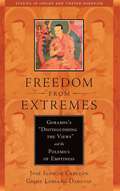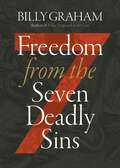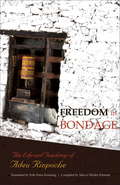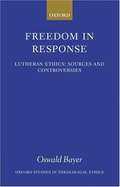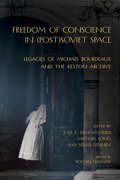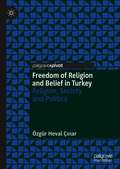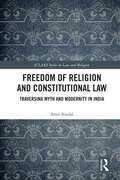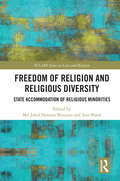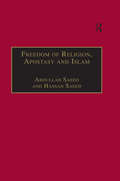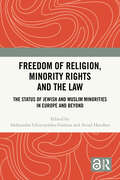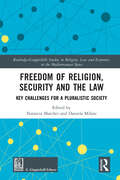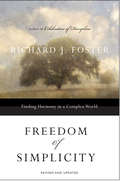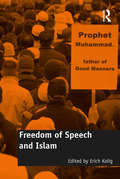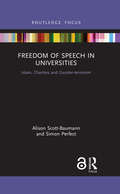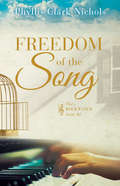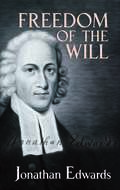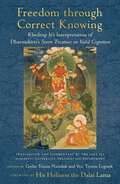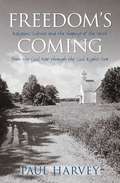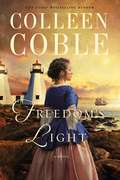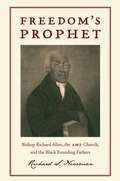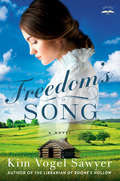- Table View
- List View
Freedom from Anxiety & Depression: 10 Steps to Get Your Life Back -Now!
by Mike MarinoBack Cover: “Anxiety and depression can literally suck the life out of you! They are the most common psychiatric disorders in America today. However, your life does not have to be defined by stress, sadness and failure. If you're feeling hopeless and helpless this book can change everything! We'll examine the information and tools you'll need to find your personal path to freedom--from biological, psychological, social and [Christian] spiritual perspectives. You really can get your life back and live with purpose and passion! “Don't waste another day mired in the pit of anxiety and depression. Your life can be better, much better! Small changes in your thinking patterns, support community, diet and spiritual life can make a huge difference. What are you waiting for?”
Freedom from Extremes
by Jose Ignacio Cabezon Geshe Lobsang DargyayWhat is emptiness? This question at the heart of Buddhist philosophy has preoccupied the greatest minds of India and Tibet for two millennia, producing hundreds of volumes. Distinguishing the Views, by the fifteenth-century Sakya scholar Gorampa Sonam Senge, is one of the most important of those works, esteemed for its conciseness, lucidity, and profundity. Freedom from Extremes presents Gorampa's elegant philosophical case on the matter of emptiness here in a masterful translation by Geshe Lobsang Dargyay. Gorampa's text is polemical, and his targets are two of Tibet's greatest thinkers: Tsongkhapa, founder of the Gelug school, and Dolpopa, a founding figure of the Jonang school. Distinguishing the Views argues that Dolpopa has fallen into an eternalistic extreme, whereas Tsongkhapa has fallen into nihilism, and that only the mainstream Sakya view - what Gorampa calls "freedom from extremes" - represents the true middle way, the correct view of emptiness. Suppressed for years in Tibet, this seminal work today is widely regarded and is studied in some of Tibet's greatest academic institutions. Gorampa's treatise has been translated and annotated here by two leading scholars of Tibetan Buddhist philosophy, and a critical edition of the Tibetan text on facing pages gives students and scholars direct access to Gorampa's own words. Jose Cabezon's extended introduction provides a thorough overview of Tibetan polemical literature and contextualizes the life and work of Gorampa both historically and intellectually. Freedom from Extremes will be indispensable for serious students of Madhyamaka thought.
Freedom from The Seven Deadly Sins
by Billy GrahamFreedom From The Seven Deadly Sinsis a concise yet powerful exploration of the human condition through the lens of Scripture. Originally adapted from Billy Graham's impactful radio sermons, the book dives deeply into the seven cardinal sins--pride, anger, envy, impurity, gluttony, laziness, and greed. Graham unpacks each sin with clarity and compassion, illustrating its damaging effects on individuals and society. The book doesn't just diagnose these spiritual maladies; it offers actionable steps, rooted in biblical wisdom, for overcoming these destructive patterns and embracing God's transformative grace.The resurgence of interest in topics like morality, spirituality, and self-help creates fertile ground for revisiting the concept of the seven deadly sins. Current trends reveal: Moral Anxiety: In a world grappling with rapid cultural shifts, many seek a moral compass to navigate issues like greed, vanity, and anger.Renewed Interest in Ancient Wisdom: Platforms like podcasts, blogs, and social media are reviving interest in traditional virtues and vices, often using secularized or philosophical approaches.Mental Health Focus: Pride, envy, and anger frequently appear as underlying factors in discussions on anxiety, depression, and relational breakdowns.The book's straightforward, biblically grounded approach makes it accessible for a wide range of readers, but the deeper philosophical and theological reflections are likely to resonate more strongly with adults who are at a stage of life where they are engaging with their spiritual journey in a meaningful way.This book is perfect for:Readers seeking spiritual growth and clarity amidst modern moral dilemmas.Faith-based counselors and church leaders looking for discussion material.Individuals who feel burdened by guilt and seek a redemptive path forward.By blending biblical truth with relatable insights, Freedom from The Seven Deadly Sins equips readers to break free from the snares of sin and step into the abundant life God desires for them.Billy Graham's approach uniquely combines timeless Christian principles with practical guidance, providing readers a hopeful and redemptive path forward. Freedom from The Seven Deadly Sins now includes a special Pray the Scriptures section with specially chosen verses to help readers overcome the grip of the seven deadly sins and find God's help and direction, along with the hope and freedom they need to live in peace.
Freedom in Bondage
by Erik Pema Kunsang Marcia Binder Schmidt Rinpoche Adeu Rinpoche TsoknyiAdeu Rinpoche's life was extraordinary from the beginning. He was recognized by an incarnation of the previous Adeu Rinpoche and enthroned at the age of seven as the Eighth Adeu Rinpoche. As a child and teenager he mastered writing, calligraphy, poetry, astrology, mandala painting, prayer, and meditation. Then, in 1958 at the age of twenty-seven, his monastery was attacked and all sacred texts and statues were completely destroyed by the Chinese as part of the Cultural Revolution. Sentenced to fifteen years in prison for his religious beliefs, the author was sent to a remote labor camp, where he watched many of his friends die under the harsh conditions. But imprisonment had an unexpected blessing: he met many accomplished masters, including the late Khenpo Munsel, and learned many practices from them. Freedom in Bondage offers a portrait of the life and philosophy of one of the twentieth century's most respected meditation masters--his early training in spiritual practices, his flight and capture, interrogation and sentencing, and the years in prison. His voice is calm and nonjudgmental, uplifting the reader with his compassion for his captors. The title captures the author's inner liberation in a dire situation.From the Trade Paperback edition.
Freedom in Response: Sources and Controversies
by Oswald BayerThe leitmotif of Freedom in Response, as the title suggests, is a reasoned exposition of the nature of freedom, as it is presented in the Bible and developed by such later theologians as Martin Luther.
Freedom of Conscience in: Legacies of Michael Bourdeaux and the Keston Archive (NIU Series in Slavic, East European, and Eurasian Studies)
by Rowan Williams Michael Long Julie K. DeGraffenried Xenia DennenFreedom of Conscience in (Post)Soviet Space, a collection of original essays edited by Julie K. deGraffenried, Michael Long, and Xenia Dennen, is inspired by the work of Michael Bourdeaux, the holdings of the Keston Archive, and continuing questions of freedom of conscience. Ranging from England to Siberia and moving chronologically from 1917 to the twenty-first century, this book reveals the unique organization and methodology behind the Keston's collection of materials and the ways those in the West thought about religion and communism during the Cold War, including the connection between religious liberty and human rights.The essays demonstrate the depth and breadth of current research on religion in communist and postcommunist contexts, a much-needed corrective to contemporary political uses of religious freedom. Bourdeaux's activism and preservation of materials influenced many fields of study, as reflected by contributing authors' varied disciplines—history, theology, sociology, languages, and literature. A preface by the theologian and former Archbishop of Canterbury Rowan Williams comments on Michael Bourdeaux's life and significance.
Freedom of Religion and Belief in Turkey: Religion, Society and Politics
by Özgür Heval ÇınarThe freedom of thought, conscience, and religion, from which stem the tenets of pluralism, tolerance, and open-mindedness, are some of the most basic freedoms of a democratic society. This book illustrates the current state of the freedom of religion or belief in Turkey and the challenges and complex problems facing it, concentrating on the most topical issues: being compelled to reveal one’s religion and beliefs on the national identity card; the right of conscientious objection and conscientious objectors; compulsory religious education; recognition of faith groups and the opening of places of worship; and using and wearing religious symbols and dress in the public sphere.
Freedom of Religion and Constitutional Law: Traversing Myth and Modernity in India (ICLARS Series on Law and Religion)
by Amit BindalThis book investigates the intersection of religion and modern law. It explores how secular courts encounter the religious or mythical question which is disavowed by modern institutions. It questions the private-public dichotomy of liberal constitutionalism which relegates religion to the private sphere. It argues that in ex-colonial societies like India which are foundationally and diversely religious, the courts need to work through and engage with the difficulties and complexities posed by their continual encounter with the question of religion rather than re-affirming the myth of separation of law and myth, state and religion. This work demonstrates that any other approach leads to its repression and resultant reemergence in various forms. Such an approach of working through religious categories will be effective in the struggle against religious fanaticism that has seen a resurgence in contemporary times. The book will be a valuable resource for students and academics working in law, religious studies, history and political science.
Freedom of Religion and Religious Diversity: State Accommodation of Religious Minorities (ISSN)
by Md Jahid Hossain Bhuiyan Ann BlackToday, pluralism is increasingly the norm and can be seen as a permanent characteristic of modernity. As seen in world events, religion has not become irrelevant but more diverse, giving rise to a complex web of religion and belief minorities, together with intra-plural majorities. Nations seek ways to implement the ideal of freedom of religion, but as this book shows, whether East or West, in the global North or the South, there is no simple formalism for accommodating religious diversity. Different faith communities have competing needs and demands for the same social space, with tensions inevitably arising. This book highlights responses from liberal democracies which enshrine secularism into their constitutions to other constitutions where religion and ethnic identity are enshrined to prioritise their ethno-religious majority. Western and Asian countries encounter different obstacles and challenges. With analysis from 19 international scholars, the book explores different obstacles and responses to accommodation of religious minorities in a range of jurisdictions. In a globalised world, it will be invaluable for comparative legal scholars, for law and religion scholars, researchers and students, and decision-makers, e.g., governments, non-governmental organisations, and for those who seek to better understand the challenges of our time.
Freedom of Religion, Apostasy and Islam
by Abdullah SaeedDebate on freedom of religion as a human right takes place not only in the Western world but also in Muslim communities throughout the world. For Muslims concerned for this freedom, one of the major difficulties is the 'punishment for apostasy' - death for those who desert Islam. This book argues that the law of apostasy and its punishment by death in Islamic law is untenable in the modern period. Apostasy conflicts with a variety of foundation texts of Islam and with the current ethos of human rights, in particular the freedom to choose one's religion. Demonstrating the early development of the law of apostasy as largely a religio-political tool, the authors show the diversity of opinion among early Muslims on the punishment, highlighting the substantial ambiguities about what constitutes apostasy, the problematic nature of some of the key textual evidence on which the punishment of apostasy is based, and the neglect of a vast amount of clear Qur'anic texts in favour of freedom of religion in the construction of the law of apostasy. Examining the significant challenges the punishment of apostasy faces in the modern period inside and outside Muslim communities - exploring in particular how apostasy and its punishment is dealt with in a multi-religious Muslim majority country, Malaysia, and the challenges and difficulties it faces there - the authors discuss arguments by prominent Muslims today for an absolute freedom of religion and for discarding the punishment of apostasy.
Freedom of Religion, Minority Rights and the Law: The Status of Jewish and Muslim Minorities in Europe and Beyond
by Aleksandra Gliszczyńska-Grabias Aviad HacohenThis book provides an in-depth, scholarly reflection on the challenges that arise in guaranteeing religious freedom and protection of the rights of religious minorities in law and practice. Currently, the protection of religious minorities constitutes one of the foundations of the international human rights protection systems and is provided for in the constitutions of all democratic states. The volume identifies, analyses, and assesses the legal status of religious freedom and protection of religious minorities, with special focus on Jewish and Muslim minorities in the European and Israeli legal environments. It compares the discourses on the scope and boundaries of religious freedom with the actual treatment of religious freedom in legal regulations, the case law, and in practice by the general society. The book employs the resources of comparative law and national and international law, as well as legal theory. Extensive use is also made of decisions of the international courts, including the European Court of Human Rights and the Court of Justice of the European Union. The book will be a valuable resource for academics, researchers, and policymakers working in the areas of law and religion, international human rights law, comparative constitutional law, and religious studies.
Freedom of Religion, Security and the Law: Key Challenges for a Pluralistic Society (Routledge-Giappichelli Studies in Religion, Law and Economics in the Mediterranean Space)
by Natascia Marchei Daniela MilaniThis collection addresses many of the issues arising from the management of religious and cultural diversity in a multicultural society and refers to the complex relationship between the right to religious freedom and security. In recent decades, and particularly since September 2001, the right to religious freedom, which has hitherto been widely protected, has come up against a significant challenge in terms of security, or rather, in the subjectively and publicly perceived feelings of security. This book collects original theoretical, legal and comparative contributions addressing several implications for the right to freedom of religion or belief through the lens of security. It offers a new key to understanding how to manage the processes of integration of religious diversity in multifaith societies. Written by leading experts in the area, the work reveals the importance of avoiding simplistic conclusions and unfounded prejudices about religious freedom, and of limiting restrictive or repressive interventions to situations of genuine danger. The book will be an essential resource for researchers, academics and policy-makers working in the areas of Law and Religion, Human Rights Law and Security Studies.
Freedom of Simplicity
by Richard J. FosterWritten in the same warm, accessible style as Richard Foster's best-selling "Celebration of Discipline, Freedom of Simplicity articulates a creative, more human style of living and points the way for Christians to make their lives "models of simplicity." Foster provides a way to rethink our priorities and to "seek first God's kingdom and his righteousness." He shows us how to live in harmony with the rich complexity of life while stressing the relation of simplicity to prayer, solitude, and all the Christian Disciplines.
Freedom of Simplicity:
by Richard J. FosterA revised and updated edition of the manifesto that shows how simplicity is not merely having less stress and more leisure but an essential spiritual discipline for the health of our soul.
Freedom of Simplicity: Finding Harmony in a Complex World
by Richard J. FosterA revised and updated edition of the manifesto that shows how simplicity is not merely having less stress and more leisure but an essential spiritual discipline for the health of our soul.
Freedom of Simplicity:ition
by Richard J. FosterA revised and updated edition of the manifesto that shows how simplicity is not merely having less stress and more leisure but an essential spiritual discipline for the health of our soul.
Freedom of Speech and Islam
by Erich KoligFreedom of speech and expression is considered in the West a high public good and an important social value, underpinned by legislative and ethical norms. Its importance is not shared to the same extent by conservative and devout Muslims, who read Islamic doctrines in ways seemingly incompatible with Western notions of freedom of speech. Since the Salman Rushdie affair in the 1980s there has been growing recognition in the West that its cherished value of free speech and associated freedoms relating to arts, the press and media, literature, academia, critical satire etc. episodically clash with conservative Islamic values that limit this freedom for the sake of holding religious issues sacrosanct. Recent controversies - such as the Danish cartoons, the Charlie Hebdo affair, Quran burnings, and the internet film ’The Innocence of Muslims’ which have stirred violent reactions in the Muslim world - have made the West aware of the fact that Muslims’ religious sensitivities have to be taken into account in exercising traditional Western freedoms of speech. Featuring experts across a spectrum of fields within Islamic studies, Freedom of Speech and Islam considers Islamic concepts of blasphemy, apostasy and heresy and their applicability in the modern world.
Freedom of Speech in Universities: Islam, Charities and Counter-terrorism (Islam in the World)
by Alison Scott-Baumann Simon PerfectFreedom of speech and extremism in university campuses are major sources of debate and moral panic in the United Kingdom today. In 2018, the Joint Committee on Human Rights in Parliament undertook an inquiry into freedom of speech on campus. It found that much of the public concern is exaggerated, but identified a number of factors that require attention, including the impact of government counter-terrorism measures (the Prevent Duty) and regulatory bodies (including the Charity Commission for England and Wales) on freedom of speech. This book combines empirical research and philosophical analysis to explore these issues, with a particular focus on the impact upon Muslim students and staff. It offers a new conceptual paradigm for thinking about freedom of speech, based on deliberative democracy, and practical suggestions for universities in handling it. Topics covered include: The enduring legacy of key thinkers who have shaped the debate about freedom of speech The role of right-wing populism in driving moral panic about universities The impact of the Prevent Duty and the Charity Commission upon Muslim students, students’ unions and university managers Students’ and staff views about freedom of speech Alternative approaches to handling freedom of speech on campus, including the Community of Inquiry This highly engaging and topical text will be of interest to those working within public policy, religion and education or religion and politics and Islamic Studies.
Freedom of the Song: A Guide to Transformational Ministry with Next Generation Women (Rockwater Suite #2)
by Phyllis Clark NicholsLife's true beauty is found when the heart is set freeCaroline Carlyle has finally shed the heavy shackles of grief and rediscovered her heart's song. Between her return to making music and a budding relationship with the charming Roderick Adair, Caroline's life is full of fresh inspiration and new hope.But just as she begins to experience this freedom, Caroline discovers that one of her piano students is carrying a painful burden of her own. Bella, a prodigious musical savant, and her caretaker, Gretchen, share a dark, hidden past—more dangerous and complex than Caroline ever could have anticipated.The more Caroline uncovers, the deeper her loyalty to the two women grows. Can Caroline help Bella and Gretchen find the same freeing power of love to break the hold of secrets and oppression?
Freedom of the Will
by Jonathan EdwardsEighteenth-century theologian Jonathan Edwards remains a significant influence on modern religion, and this book constitutes his most important contribution to Christian thought. Edwards raises timeless questions about desire, choice, good, and evil, contrasting the opposing Calvinist and Arminian views of free will and addressing issues related to God's foreknowledge, determinism, and moral agency.
Freedom through Correct Knowing: On Khedrup Jé's Interpretation of Dharmakirti
by Sera Jey English Translation DepartmentDiscover a clear and accessible translation with commentary on key parts of Khedrup Jé&’s Clearing Mental Darkness. Composed at the request of His Holiness the Dalai Lama, this translation with commentary on key parts of Khedrup Jé&’s Clearing Mental Darkness: An Ornament of Dharmakirti&’s &“Seven Treatises on Valid Cognition&” is intended for all levels of understanding. You&’ll learn how a mind realizes its object, which types of consciousness realize their objects, and when a consciousness is considered to be valid in the sense of realizing its object. Having explained valid cognizers, or direct perceivers, which are essential to understanding the four noble truths, Khedrup Jé goes on to brilliantly elucidate this essential teaching of the Buddha and offers a lucid presentation of how to progress on the spiritual paths of liberation and enlightenment, including how to generate yogic perception directly realizing selflessness. With this, one develops an unmistaken realization of the fundamental reality of selflessness of persons and phenomena, which eliminates ignorance, the root cause of all mental afflictions and samsaric suffering.
Freedom's Coming
by Paul HarveyIn a sweeping analysis of religion in the post-Civil War and twentieth-century South, Freedom's Coming puts race and culture at the center, describing southern Protestant cultures as both priestly and prophetic: as southern formal theology sanctified dominant political and social hierarchies, evangelical belief and practice subtly undermined them. The seeds of subversion, Paul Harvey argues, were embedded in the passionate individualism, exuberant expressive forms, and profound faith of believers in the region.Harvey explains how black and white religious folk within and outside of mainstream religious groups formed a southern "evangelical counterculture" of Christian interracialism that challenged the theologically grounded racism pervasive among white southerners and ultimately helped to end Jim Crow in the South. Moving from the folk theology of segregation to the women who organized the Montgomery bus boycott, from the hymn-inspired freedom songs of the 1960s to the influence of black Pentecostal preachers on Elvis Presley, Harvey deploys cultural history in fresh and innovative ways and fills a decades-old need for a comprehensive history of Protestant religion and its relationship to the central question of race in the South for the postbellum and twentieth-century period.In a sweeping analysis of religion in the post-Civil War and twentieth-century South, Freedom's Coming puts race and culture at the center, describing southern Protestant cultures as both priestly and prophetic: as southern formal theology sanctified dominant political and social hierarchies, evangelical belief and practice subtly undermined them. Harvey explains how black and white religious folk within and outside of mainstream religious groups formed a southern "evangelical counterculture" of Christian interracialism that challenged the theologically grounded racism pervasive among white southerners and ultimately helped to end Jim Crow in the South.-->
Freedom's Light
by Colleen CobleUSA TODAY bestselling author Colleen Coble explores the mystery and the romance of the Revolutionary War. A young lighthouse keeper must navigate the dangerous waters of revolution and one man’s obsession with her to find safe harbor with the sea captain she loves. Hannah Thomas believes she’s escaped Galen Wright’s evil intentions by marrying an older lighthouse keeper. Seemingly safe in faraway Massachusetts, her world is upended when John is killed in one of the first battles of the Revolutionary War. Hannah is allowed to continue the difficult task of tending the twin lighthouses in John’s place, though she faces daily disapproval from John’s family. She thinks her loneliness will subside when her younger sister arrives, but she finds Lydia’s obsession with Galen only escalates the dangerous tides swirling around her.A stormy night brings a shipwrecked sea captain to Hannah’s door, and though he is a Tory, her heart is as traitorous as the dark-eyed captain. Even though she discovers Birch Meredith isn’t the enemy he seemed at first, Hannah isn’t sure their love will ever see the light of freedom.
Freedom's Prophet: Bishop Richard Allen, the AME Church, and the Black Founding Fathers
by Richard S. NewmanIn this biography of Richard Allen, founder of the first major African-American church and the leading black activist of the early American republic, Newman describes Allen's continually evolving life and thought, setting both in the context of his times. From Allen's early antislavery struggles and belief in interracial harmony to his later reflections on black democracy and black emigration, Newman traces Allen's impact on American reform and reformers.
Freedom's Song: A Novel
by Kim Vogel SawyerHer voice made her a riverboat&’s darling—and its prisoner. Now she&’s singing her way to freedom in this powerful novel from the bestselling author of The Librarian of Boone's Hollow.&“[An] enjoyable faith-filled adventure . . . Sawyer&’s episodic narrative and rich assortment of characters fighting for freedom provide the story with many twists and unexpected side-plots.&”—Publishers WeeklyIndentured servant Fanny Beck has been forced to sing for riverboat passengers since she was a girl. All she wants is to live a quiet, humble life with her family as soon as her seven-year contract is over. So when she discovers that the captain has no intention of releasing her, she seizes a sudden opportunity to escape—an impulse that leads Fanny to a group of enslaved people who are on their own dangerous quest for liberty. . . .Widower Walter Kuhn is overwhelmed by his responsibilities to his farm and young daughter, and now his mail-order bride hasn&’t arrived. Could a beautiful stranger seeking work be the answer to his prayers? . . . After the star performer of the River Peacock is presumed drowned, Sloan Kirkpatrick, the riverboat&’s captain, sets off to find her replacement. However, his journey will bring him face to face with his own past—and a deeper understanding of what it truly means to be free. . . . Uplifting, inspiring, and grounded in biblical truth, Freedom&’s Song is a story for every reader who has longed for physical, emotional, or spiritual delivery.

